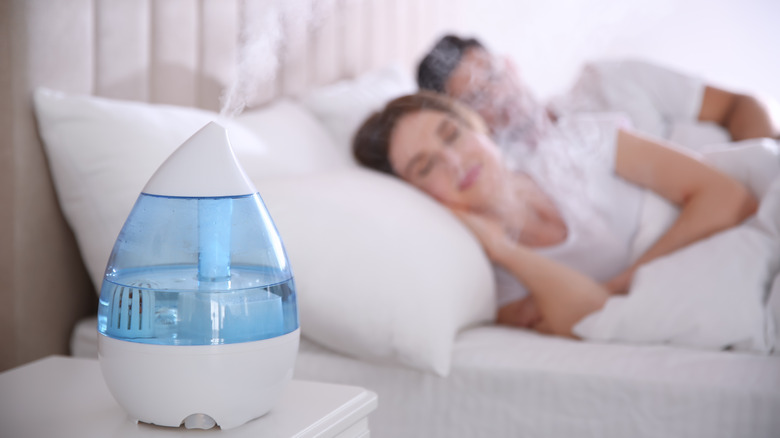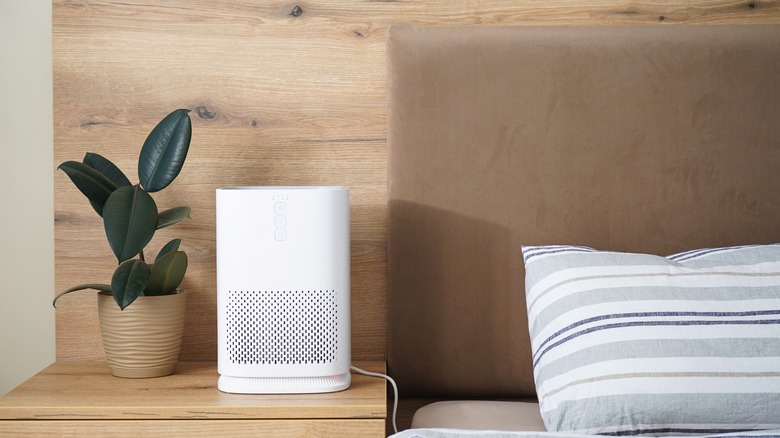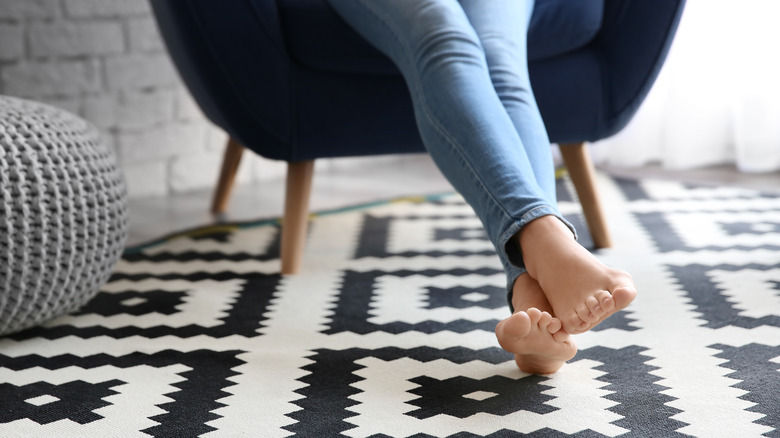4 Signs That You Need A Humidifier In Your Home
A humidifier is an electronic device that increases moisture in the air by emitting vapor or steam. By doing this, it works to combat dry air and prevent the various problems that it can cause in the body and the home. According to Healthline, humidifiers can relieve throat and skin dryness, nose and vocal cord irritation, coughs, congestion, and other issues. Excess moisture, on the other hand, can also cause issues, which is why the humidity in your home needs to be at a balanced level and should be tested regularly.
The American Academy of Allergy Asthma and Immunology (AAAAI) states that the appropriate level of humidity is between 40 and 50%. Setting your humidifier at the proper level for the season and temperature goes a long way towards keeping you healthy and making your home feel comfortable. If you've been considering getting one or you're not quite sure yet, here are the most common signs that you may need a humidifier in your home.
Dry skin
If you experience dried-out skin, hair, and lips might be a sign that you need a humidifier. Itchiness, flakiness, cracking, and redness are all symptoms that can be remedied by increased humidity in the air, explains Medical News Today. When skin is cracked and dry, it becomes easier for microbes and other impurities that cause infections and illnesses to enter the skin. Using a humidifier, especially in extreme weather, can help you balance the moisture levels in your home and prevent health issues. Hydrated skin can also keep you looking younger, reduce breakouts, and maintain an even texture, per Byrdie.
According to the Cleveland Clinic, genetics is one of the main causes of dry skin as some people produce less filaggrin than normal, which is a protein that helps maintain the skin barrier. In addition to using a humidifier, moisturizing often, drinking enough water, and cutting down on hot showers are other ways to keep your skin properly hydrated.
Cold and allergy symptoms
Feeling congested, coughing, sore throats, and dry nostrils are very common signs that your home needs a humidifier. If you're regularly experiencing these during cold seasons or when the air is dry, it's often because your nose and mouth are dried out. The mucus in your nose is essential for keeping out the organisms that enter your body and make you sick, explains WebMD, so you're more susceptible to colds and allergies when your nostrils are dry. If you have asthma, this also can make you more vulnerable to an attack.
While cold and dry air can cause cold and allergy symptoms, too much moisture in the air can create mold in the house. That's why it's important to not only maintain the right level of moisture but also to ensure that the humidifier is kept clean, advises Byrdie. When it's clean, it will circulate air that is free of harmful allergens and other organisms.
Cracks in furniture and surfaces
Did you know that cracks in your furniture, drywall, and wallpaper can be the result of overly dry and cold air? Materials like paper and wood are porous and sensitive to extreme dryness and moisture, so your home needs to maintain a balanced level of both. Since it is a natural material, wood goes through changes depending on its environment — it shrinks due to a lack of moisture in dry air, and retains moisture and swells in warm humid air.
With this In mind, wooden furniture, floors, and doors need to be adequately protected, well maintained and taken care of throughout the year. According to Rustic Furniture Outlet, humidity levels can change considerably depending on the season, therefore it is important to monitor and adjust those levels to prevent your furniture from cracking or shrinking in the summer, or swelling during the damp winter months.
Static electricity
If you are experiencing a little too much static electricity around the house, this can be another sign that you need a humidifier. When static electricity builds up, it generates an electrical charge whenever two conductive surfaces come in contact with each other. This is caused by cold, dry air, especially in the winter. A humidifier is a great solution to prevent shocks while doing normal things like walking on a carpet and touching surfaces because a balanced level of humidity will make the atmosphere more conductive and avert the build-up of those electric charges.
A static charge occurs when the relative humidity is under 40%, explains Condair, therefore, setting your humidifier to around 50% should help to eliminate the problem. In addition to increasing the moisture in the air, wearing shoes in the house can also help since they create a non-conductive barrier between the skin and the ground.




